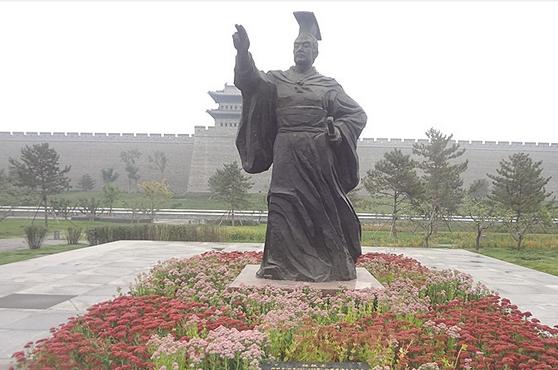
Statue of Li Ke
Li Ke (李恂) (c. late 1st century to early 2nd century AD), courtesy name Shuying, was a native of Linjing (present-day Zhenyuan, Gansu). An official known for his incorruptibility during the Eastern Han Dynasty. He served as a shishi, a yanzhou assassin, a zhangye taishou, and a lieutenant in the western region. Li Ke was honest and self-respecting for the officials, and neither accepted gifts nor gave gifts to flatter. Because of his uprightness, he offended the great general Dou Xian and was framed and dismissed from office on the charge of fabricating.
During the Eastern Han Dynasty, Yanzhou was relatively rich among the thirteen states in the country, not only rich in products, but also rich in luxury. When Li Ke was in charge of the history of Yanzhou, he was praised by the world for his honesty and frugality. He is diligent and self-motivated, proud of frugality in everything, and the house he lives in does not seek luxury and is never decorated; the living room is even more frugal, "mat sheepskin, cloth quilt", a very ordinary sheepskin is a mattress on the mat, covered with a quilt made of linen.
Emperor He of Han succeeded to the throne at the age of 10, and his stepmother Empress Dowager Dou took the throne. The Dou family was temporarily in power, and Empress Dou's elder brother, the great general Dou Xian, held great military and political power, and he was even more soaring and doing whatever he wanted. Dou Xian northernly attacked the Xiongnu and stationed his army in Wuwei, and in order to curry favor with him, officials from all over the country sent special products and even gold and silver treasures to Wuwei. However, Li Ke, who was the taishou of Zhangye at the time, was indifferent, and his subordinate officials all advised Li Ke: Dou Xian is powerful, but he is narrow-minded and narrow-minded, and officials from all over the world come to visit from thousands of miles, Zhangye is very close to Wuwei, and you should show something even more when you are close. After Li Ke listened, he said sternly, "I don't have any official reports, so I don't have to go." Because he did not tend to be inflammatory and refused to give gifts, Dou Xian was very annoyed, but he could not do anything about him, so he had to rely on rumors and slander, and finally Li Ke was deposed. It is said that after being dismissed, Li Ke actually had no money to hire a car or horse, and could only walk thousands of miles back to his hometown, which shows that he is a clean and honest official.
Because of his prestige in the imperial court, Li Ke was soon appointed as a Gurudwara (the emperor's close attendant) and was entrusted with the important task of serving as a deputy lieutenant in the Western Regions. At that time, the western region was not only a large number of small countries, but also very rich, producing many rare treasures. After Li Ke arrived in the Western Regions, the monarchs, attendants, envoys, and Merchants of various small countries sent people to give Li Ke slaves, good horses, precious spices, gold, silver and jade, and other items according to the custom, but Li Ke did not accept them either. This made the gift givers very confused, they all thought that there were fewer things to send, and several times they sent people with a large amount of money to give gifts, but they were all rejected by Li Ke one by one. Later, the monarchs and officials of the Western Regions all found out li ke's personality and admired him very much, and the allusion that "Li Ke was not fed" has also been sung to this day.
Li Ke's upright personality could not be tolerated by the traitorous party, and he was eventually framed and dismissed from his post. After returning home, he encountered a famine year, and his friend sent him food, but he insisted on not accepting it. Later, he lived in seclusion in his hometown of Yamakawa Jiecaolu, and made a living by weaving reed mats with his disciples. In his later years, he moved to Hanguguan, Shaanxi, refused the support of his friends, and collected oaks to finance himself until his death at the age of 96.
Li Ke was self-purifying as an official, not a magnate, returned to the countryside, and was deeply admired and praised by the people under the leadership of the Qing Covenant. (Contributed by Yan Yuping, Editor Yang Xia)